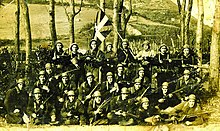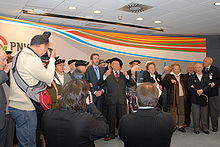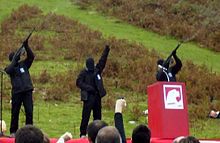This article has multiple issues. Please help improve it or discuss these issues on the talk page. (Learn how and when to remove these messages)
|
| Basque Army | |
|---|---|
| Euzko Gudarostea | |
 Amaiur Battalion of the Euzko Gudarostea during the Spanish Civil War. Biscay, 1937. Amaiur Battalion of the Euzko Gudarostea during the Spanish Civil War. Biscay, 1937. | |
| Active | 17 July 1936 – 26 August 1937 |
| Country | |
| Allegiance | Basque Government |
| Type | Infantry |
| Size | Corps |
| Garrison/HQ | Bilbao |
| Engagements | Spanish Civil War: Villarreal Offensive, Biscay Campaign |
| Commanders | |
| Chief of Staff | Alberto de Montaud Noguerol |
| Political commissar | Justo Somonte Iturrioz |
| Notable commanders | Kandido Saseta † Jose Antonio Agirre |
Euzko Gudarostea (spelled in modern Basque: Eusko Gudarostea, lit. 'Basque army') was the name of the army commanded by the Basque Government during the Spanish Civil War. It was formed by Basque nationalists, socialists, communists, anarchists and republicans under the direction of lehendakari José Antonio Aguirre and coordinating with the army of the Second Spanish Republic. It fought the troops of Francisco Franco during 1936 and 1937. It surrendered to the Italian Corpo Truppe Volontarie at Santoña (province of Cantabria), while the rest of the Republican army kept fighting until 1939. This event is called the Santoña Agreement, Pact of Santoña, or Treason of Santoña by some Spanish leftists.
Gudari
The Basque word for a soldier, gudari (plural gudariak), is a neologism (from guda, "war", thus meaning "warrior" literally). The Standard Basque word is the Romance-derived soldadu. Like other Basque nationalist neologisms (ikurriña, lendakari), the meaning of gudari has been restricted to Basque concepts. The Basque word for an army is the Romance-derived armada.


The members of the Basque militant ETA consider themselves gudariak continuing the struggle of the Civil War Basque soldiers. This is contested by those war veterans that support the Basque Nationalist Party (PNV), Spanish Socialist Workers' Party or Communist Party.
The Gudari Eguna ("warrior day") is thus celebrated separately:
- by ETA supporters on 27 September, remembering the date (1975) of the execution of Jon Paredes (a.k.a. Txiki) in Cerdanyola del Vallès, Barcelona, and Ángel Otaegui in Burgos.
- by PNV supporters on 9 November since 1937.
See also
- Basque Auxiliary Navy
- Ertzaintza, the wartime police under the Basque government.
- Eusko Gudariak, the anthem of the Basque soldiers.
- Lepoan hartu, a song by Telesforo de Monzón about taking the corpse of a fellow soldier and going on.
References
- Hiztegia 3000 Archived 2011-08-10 at the Wayback Machine.
- Gara: 27-IX-75: El día en que Franco gastó sus últimas balas Archived 2005-12-26 at the Wayback Machine.
- PNV press release: Arzalluz acudirá el domingo al Gudari Eguna en Bilbao (2003/11/09) Archived 2011-08-07 at the Wayback Machine
- Ertzaina 1936 Archived 2009-10-03 at the Wayback Machine, Museo Policia Vasca
External links
- (in Spanish) Los últimos soldados vivos del lehendakari Aguirre Archived 2019-09-01 at the Wayback Machine, Iban Gorriti, 1 September 2019, Deia.
| Armies of the Spanish Republican Armed Forces | |
|---|---|
This article related to the Basque Country is a stub. You can help Misplaced Pages by expanding it. |
This article about the Spanish Civil War is a stub. You can help Misplaced Pages by expanding it. |
- 1936 establishments in the Basque Country (autonomous community)
- Military units and formations of the Spanish Civil War (Republican faction)
- Military history of the Basque Country (autonomous community)
- Armed Forces of the Second Spanish Republic
- Armies of Spain
- 1937 disestablishments in the Basque Country (autonomous community)
- Basque Country stubs
- Spanish Civil War stubs